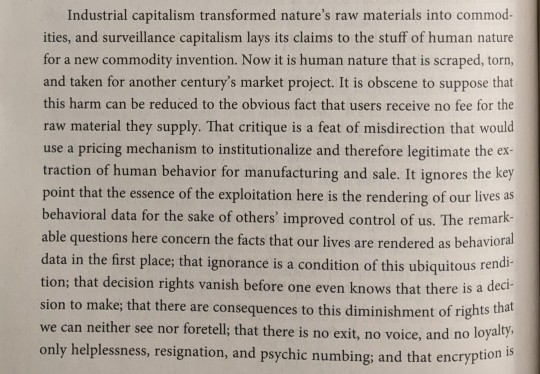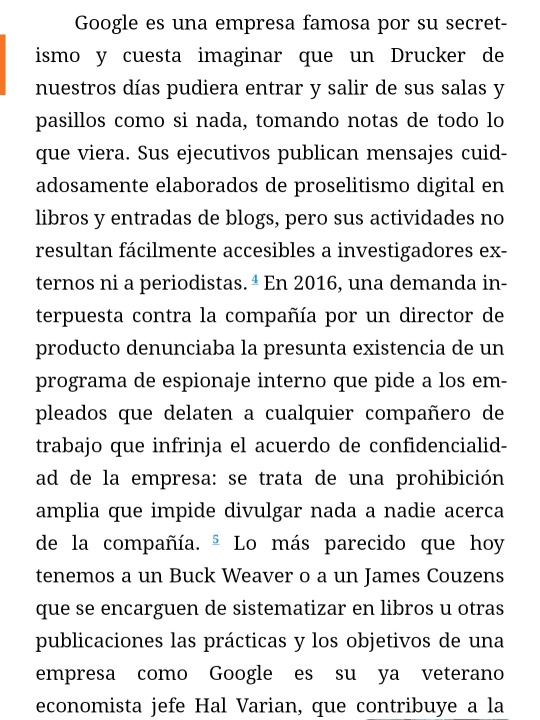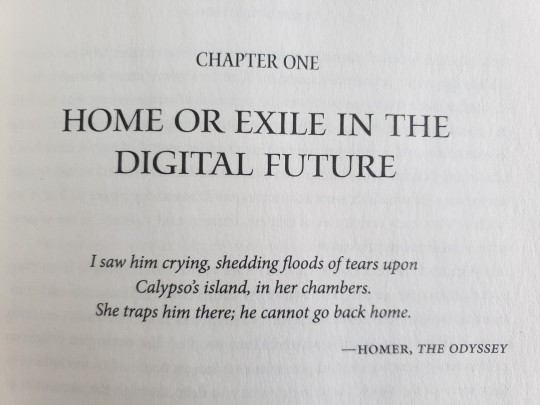#shoshana zuboff
Text
I'm reading the 'Age of Surveillance Capitalism' book by Shoshana Zuboff, and it is haunting me, making me feel uncomfortable and making me want to move offline.
We've all been aware that google, facebook, and all other digital tech companies are taking our data and selling it to advertisers, but according to the book, that is not the end goal.
The book goes into the rise of google, and how it made itself better by constantly studying the searches people were inputting, and learning how to offer better information faster. Then, they were able to develop ways to target adverts, without even selling the data, but by making their own decisions of what adds should be targeted at what audience. But they kept collecting more and more data, and basically studying human behaviour the way scientists study animals, without their knowledge or consent. Then they bought youtube, precisely because youtube had such vast amounts of human behaviour that could be stored and studied.
But they're not only using that data to target adds at us. They've been collecting data in ways that feel unexpected and startling to me. And whenever they're challenged or confronted with it, they pretend it was a mistake, or unintentional, and it's scary how far they've been able to get away with it.
For example, during their street-view data collecting, the google car had been connecting to every wifi available and taking encrypted, personal data from households. When they got found out, they've explained it was not intentional, and a fault of a lone researcher who had gone rouge, and they evaded getting sued or being held accountable for it at all. Countries have created new laws and regulations and google kept evading it and in the end they claimed 'you know if you keep trying to regulate us, we'll just do things secretly'. Which is a wild thing to say and expect to get away with!
Another thing that struck me was that governments, which at first wanted to restrict data collection, later asked tech companies to monitor and prevent content connected to terrorism, and the companies didn't like the idea of being a tool of the government, so they claimed the terrorism data is being banned for 'being against their policy'. Which makes me believe they didn't want to remove that content at all, after all, they could have done it beforehand, they didn't feel any natural incentives to do so.
The entire story is filled with researchers who don't seem to experience the human population as other human beings. They don't believe we deserve privacy, or dignity, or any say in what is being collected or done to us. Hearing their quotes and how they describe the people they're researching shows clearly they consider us all stupid, and our desires for privacy, self-harming. They insist we'd be better off if we just accepted their authority and gave them any data they wanted without complaining or being upset it's being collected without our knowledge.
Even though companies claim at all times that the data is non-identifiable, the book explains just how data is handled and how easy it is to identify anyone whose private conversations are recorded; people say their names, their addresses, places they're going, friends they're meeting, they say names of their family members, their devices record their location and their habits, it is extremely easy to identify anyone whose information has been collected. It can be identified and sold to information agencies.
I believed when it was explained to me that most of the data collection was just for add targeting, and that it would be used only for advertisement purposes, but they're not only collecting data anymore, they're deciding what data is being fed to us, and recording our reactions, learning how they can affect and manipulate our behaviour. We know all algorithms feed us controversial, enraging and highly-emotional content in order to drive engagement, but it's more than that. They've discovered how they can influence more or less people to vote. The mere idea of that makes me go cold, but they talk about it like it's just another thing they can do, so why not? Companies who have experimented and learned so much about influencing human behaviour give themselves the right to influence it as they see fit, because why wouldn't they? Since they have the power to do it, and all lawsuits and regulations can't stop them, why wouldn't they make a game out of it?
I can't imagine how many experiments they did before feeling so confident and blase about this and casually influencing the elections, again, seemingly just for the sake of an experiment.
The book compares this type of behaviour manipulation to totalitarianism and surveillance state, and it shows how the population is slowly losing parts of their freedoms without realizing it is even happening. Human behaviour has changed due to online influence, and it keeps changing rapidly, with every new popular website that is influencing human behaviour. They've learned that humans are influenced mostly by behaviour of other humans, and they can decide what kind of content or influence to send our way to get desired results.
I love how the author of the book talks about humanity. She uses the term 'human future', as something we all have the right to, as opposed to future controlled by companies and influences. She describes how regular people were affected by the data collected against their will, and how they fought for their 'right to be forgotten', when google kept displaying their past struggles, damaging their dignity. She also explains the questions people should ask about how society is led: First question is, who knows? Second question, who decides? Third question, who decides who decides? She goes in detail about how the answers are held away from us, and what it does to us. She also touches very deeply on the idea of human freedom!
I recommend this book, even though it will make you feel far less secure and carefree to be online, and using anything google, facebook, twitter or any of their owned services. They are not free, and it's also incorrect to say that we're the product of them, but we are the source of the raw materials they collect in order to gain results.
#the age of surveillance capitalism#shoshana zuboff#i've learned so much#but also i do not feel okay#how about we shut down google facebook and all that#but i still wanna watch youtube T_T#they really got me with that one#and this site also has me in chokehold#other services i do not care about
291 notes
·
View notes
Text
On the strength of its lavish recruitment efforts, Google tripled its number of machine intelligence scientists in just the last few years and has become the top contributor to the most prestigious scientific journals—four to five times the world average in 2016. Under the regime of surveillance capitalism, the corporation’s scientists are not recruited to solve world hunger or eliminate carbon-based fuels. Instead, their genius is meant to storm the gates of human experience, transforming it into data and translating it into a new market colossus that creates wealth by predicting, influencing, and controlling human behaviour.
[...] We have come to take for granted that the internet enables an unparalleled diffusion of information, promising more knowledge for more people: a mighty democratizing force that exponentially realizes Gutenberg’s revolution in the lives of billions of individuals. But this grand achievement has blinded us to a different historical development, one that moves out of range and out of sight, designed to exclude, confuse, and obscure. In this hidden movement the competitive struggle over surveillance revenues reverts to the pre-Gutenberg order as the division of learning in society shades toward the pathological, captured by a narrow priesthood of privately employed computational specialists, their privately owned machines, and the economic interests for whose sake they learn.
Shoshana Zuboff, The Age of Surveillance Capitalism: The Fight For a Human Future at the New Frontier of Power
39 notes
·
View notes
Quote
Industrial capitalism transformed nature's raw materials into commodities, and surveillance capitalism lays its claims to the stuff of human nature for a new commodity invention. Now it is a human nature that is scraped, torn, and taken for another century's market project. It is obscene to suppose that this harm can be reduced to the obvious fact that users receive no fee for the raw material they supply. That critique is a feat of misdirection that would use a pricing mechanism to institutionalize and therefore legitimate the extraction of human behavior for manufacturing and sale. It ignores the key point that the essence of the exploitation here is the rendering of our lives as behavioral data for the sake of others' improved control of us. The remarkable questions here concern the facts that our lives are rendered as behavioral data in the first place; that ignorance is a condition of this ubiquitous rendition; that decision rights vanish before one even knows that there is a decision to make; that there are consequences to this diminishment of rights that we can neither see nor fortell; that there is no exit, no voice, and no loyalty, only helplessness, resignation, and psychic numbing; and that encryption is the only positive action left to discuss when we sit around the dinner table and casually ponder how to hide from the forces that hide from us.
Shoshana Zuboff, The Age of Surveillance Capitalism: The Fight for a Human Future at the New Frontier of Power
16 notes
·
View notes
Text
The Age Of Surveillance Capitalism | Эпоха надзорного капитализма
А теперь не совсем про Depeche Mode. Давно хотела здесь разместить информацию о книге профессора Гарвардского Университета Shoshana Zuboff "The Age Of Surveillance Capitalism" (Шошана Зубофф, "Эпоха надзорного капитализма", 2019, 2022). Очень актуальное и продуманное исследование про обратную сторону цифровизации и ее связь с глобальным капитализмом. Профессор приводит очень интересные и яркие примеры насчет того, как социальные сети и компании воруют наши данные и пытаются влиять на нашу траекторию жизни.
youtube
Книга размещена в Интернете в оригинале и в русском переводе.
2 notes
·
View notes
Text
“Surveillance capitalism’s products and services are not the objects of a value exchange. They do not establish constructive producer-consumer reciprocities. Instead, they are the “hooks” that lure users into their extractive operations in which our personal experiences are scraped and packaged as the means to others’ ends. We are not surveillance capitalism’s “customers.” Although the saying tells us “If it’s free, then you are the product,” that is also incorrect. We are the sources of surveillance capitalism’s crucial surplus: the objects of a technologically advanced and increasingly inescapable raw-material-extraction operation. Surveillance capitalism’s actual customers are the enterprises that trade in its markets for future behaviour.
This logic turns ordinary life into the daily renewal of a twenty-first-century Faustian compact. “Faustian” because it is nearly impossible to tear ourselves away, despite the fact that what we must give in return will destroy life as we have known it.”
Shoshana Zuboff, The Age of Surveillance Capitalism
#shoshana zuboff#the age of surveillance capitalism#quote#words#technology#capitalism#from my uni readings lol
16 notes
·
View notes
Text
“Surveillance capitalism runs contrary to the early digital dream, consigning the Aware Home to ancient history. Instead, it strips away the illusion that the networked form has some kind of indigenous moral content, that being "connected" is somehow intrinsically pro-social, innately inclusive, or naturally tending toward the democratization of knowledge. Digital connection is now a means to others' commercial ends. At its core, surveillance capitalism is parasitic and self-referential. It revives Karl Marx's old image of capitalism as a vampire that feeds on labor, but with an unexpected turn. Instead of labor, surveillance capitalism feeds on every aspect of every human's experience.” - The Age of Surveillance Capitalism, Shoshana Zuboff
15 notes
·
View notes
Text



The Age of Surveillance Capitalism, by Shoshana Zuboff
#i feel completely normal about this#image description in alt#the age of surveillance capitalism#shoshana zuboff
4 notes
·
View notes
Text

La era del capitalismo de la vigilancia, Shoshana Zuboff
0 notes
Text
currently reading:
The Age of Surveillance Capitalism. The Fight for the Future at the New Frontier of Power by professor Shoshana Zuboff
📚📚📚
#shoshana zuboff#capitalism#books#book recommendations#currently reading#the age of surveillance capitalism
1 note
·
View note
Text
serious question to anyone who actually Knows Things about the privacy problems with google’s terrifying omnipresent domination: what can I actually do to reclaim my personal data as much as possible? im in the first baby steps of the process — migrating off of google photos, using non chromium browsers, turning off location sharing when i can — but i can’t survive without Youtube, my life history is in google drive, Apple Maps is inferior etc etc i don’t know what to do i hate it here
0 notes
Text
I recognized the oldest political questions: Home or exile? Lord or subject? Master or slave? These are eternal themes of knowledge, authority, and power that can never be settled for all time. There is no end of history; each generation must assert its will and imagination as new threats require us to retry the case in every age.
Shoshana Zuboff, The Age of Surveillance Capitalism
#quotes#shoshana zuboff#under capitalism#history as illness#revolution and historical thinking#words#on the hauntological problem of historicity
0 notes
Video
youtube
Our only defense against surveillance capitalism in the short run is to avoid being surveilled. Quitting platforms which suck personal information out of you is essential to protect privacy. Avoiding cookies and trackers is another way to protect yourself.
I’m a compulsive history clearer. My history is cleared automatically when the browser (either Firefox or Safari) is closed. Sometimes I’ll clear much of it selectively in mid session. I NEVER use Chrome which is just a vacuum cleaner of personal info for Google. And speaking of Google, it’s rare for me ever to be signed in there.
To control your personal information it’s necessary to be proactive and to endure a little inconvenience. I see this inconvenience as minor and beneficial – in the same way that conscientious recycling is in the long run.
But ultimately, legislation is needed to protect internet users. There are plenty of precedents. We already have laws to protect safety, to ensure pure food and pharmaceuticals, and to regulate financial transactions. It’s long overdue for online privacy to get the same treatment.
There need to be limits on personal information which online commercial entities can collect, store, and share.
#privacy#surveillance capitalism#threat to democracy#google#social media#facebook#meta#mark zuckerberg#arthur sullivan#shoshana zuboff#benedict evans#johnny ryan#john battelle#max schrems#gdpr#guillaume couneson#quit facebook#delete facebook#leave facebook
1 note
·
View note
Text
I feel like a lot of left-wing commentators are way too willing to take at face value claims made by Google and Facebook and the like about the power of their algorithms to predict and manipulate the behaviour of their userbase.
Like, okay, back in 2012, Facebook published a study on an experiment that they nonconsensually conducted on 12 million of their users to see how they reacted to subtle changes in how the algorithm conveyed politics to them; it showed a statistically significant effect.
Okay; right now you should be asking: why did Facebook publish this study? The answer is: because they wanted to sell advertisers on their platform; they wanted to make advertisers believe that they had an omniscient tool of public manipulation. This of course should raise a few more questions, like:
How many similar studies did Facebook conduct that didn't yield a statistically significant result?
Would Facebook have published these studies, given that their aim was to sell advertisers on their platform?
How would you go about reproducing the results of this study if you, personally, do not own a massive social media platform?
Given that Facebook has evinced an absolute willingness to lie through its teeth about just about everything else in order to make a quick buck, what are the odds that their data is on the level?
How would you check, given that their data is proprietary?
And perhaps most importantly,
If Facebook was so goddamn omnipotent at manipulating public opinion in 2012, why does everyone hate them and think their platform is shit now?
Like, don't get me wrong. It's bad that these megacorporations control the dominant public forum of the 21st century. But let's not humour their claims to omnipotence.
#science and technology studies#I was just reading Shoshana Zuboff and this stood out to me#surveillance capitalism
121 notes
·
View notes
Text
Google discovered by chance or intention the source of every mapmaker's power. The great historian of cartography, John B. Harley, says it succinctly: 'Maps created empire.' They are essential for the effective 'pacification, civilization, and exploitation' of territories imagined or claimed but not yet seized in practice. Places and people must be known in order to be controlled. 'The very lines on the map,' wrote Harley, were a language of conquest which 'the invaders parcel the continent among themselves in designs reflective of their own complex rivalries and relative power.' The first US rectangular land survey captured this language perfectly in its slogan: 'Order upon the land.' The cartographer is the instrument of power as the author of that order, reducing reality to only two conditions: the map and oblivion. The cartographer's truth crystallizes the message that Google and all surveillance capitalists must impress upon all humans: if you are not on our map, you do not exist.
Shoshana Zuboff, The Age of Surveillance Capitalism: The fight for a Human Future at the New Frontier of Power
5 notes
·
View notes
Text

my humble contribution to the genre
#ive been reading the age of surveillance capitalism by shoshana zuboff very slowly for months#makes me want to scream and cry and tear my hair out. but it's a very good book
3 notes
·
View notes
Text

oh this is gonna fuck me up isn't it
4 notes
·
View notes